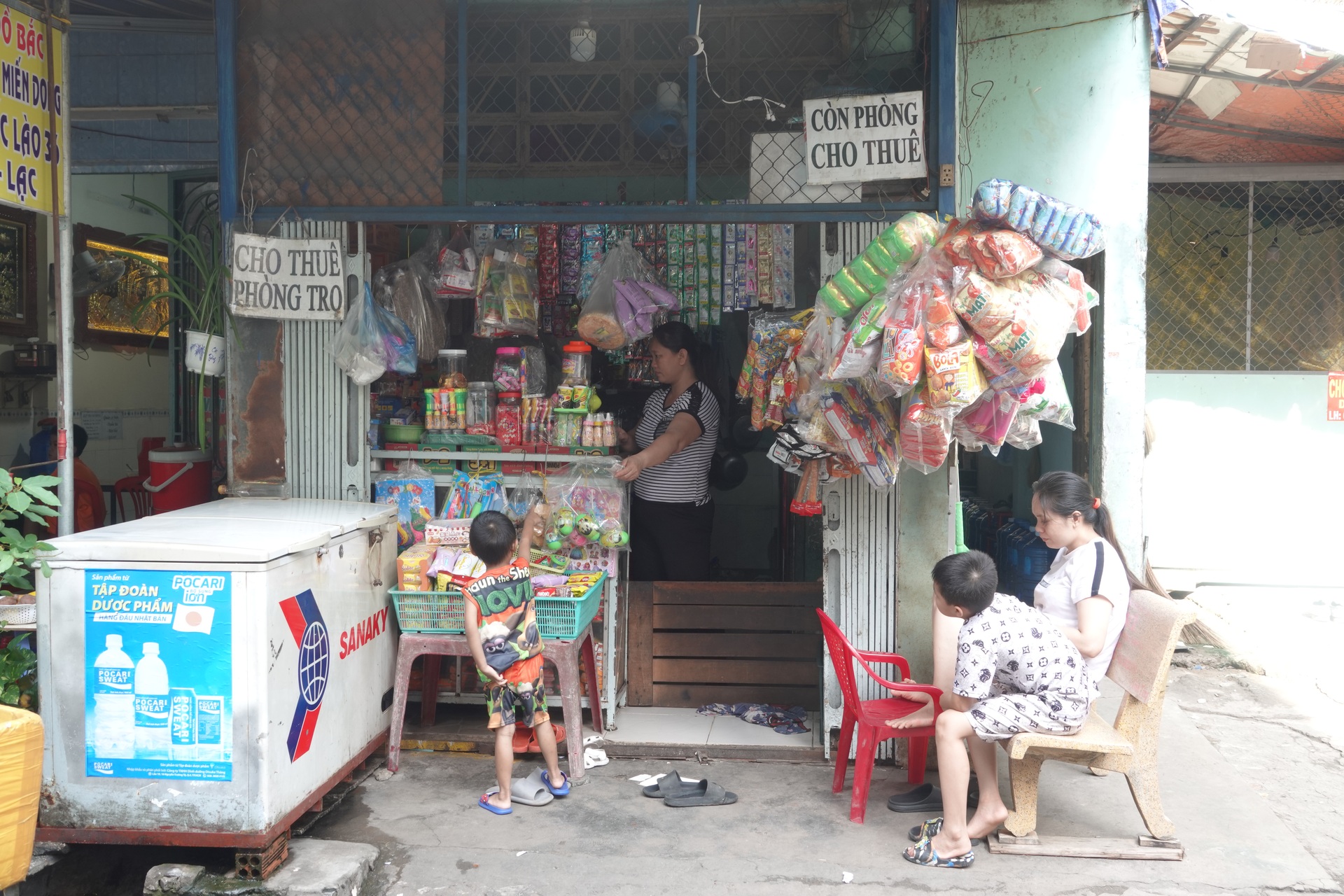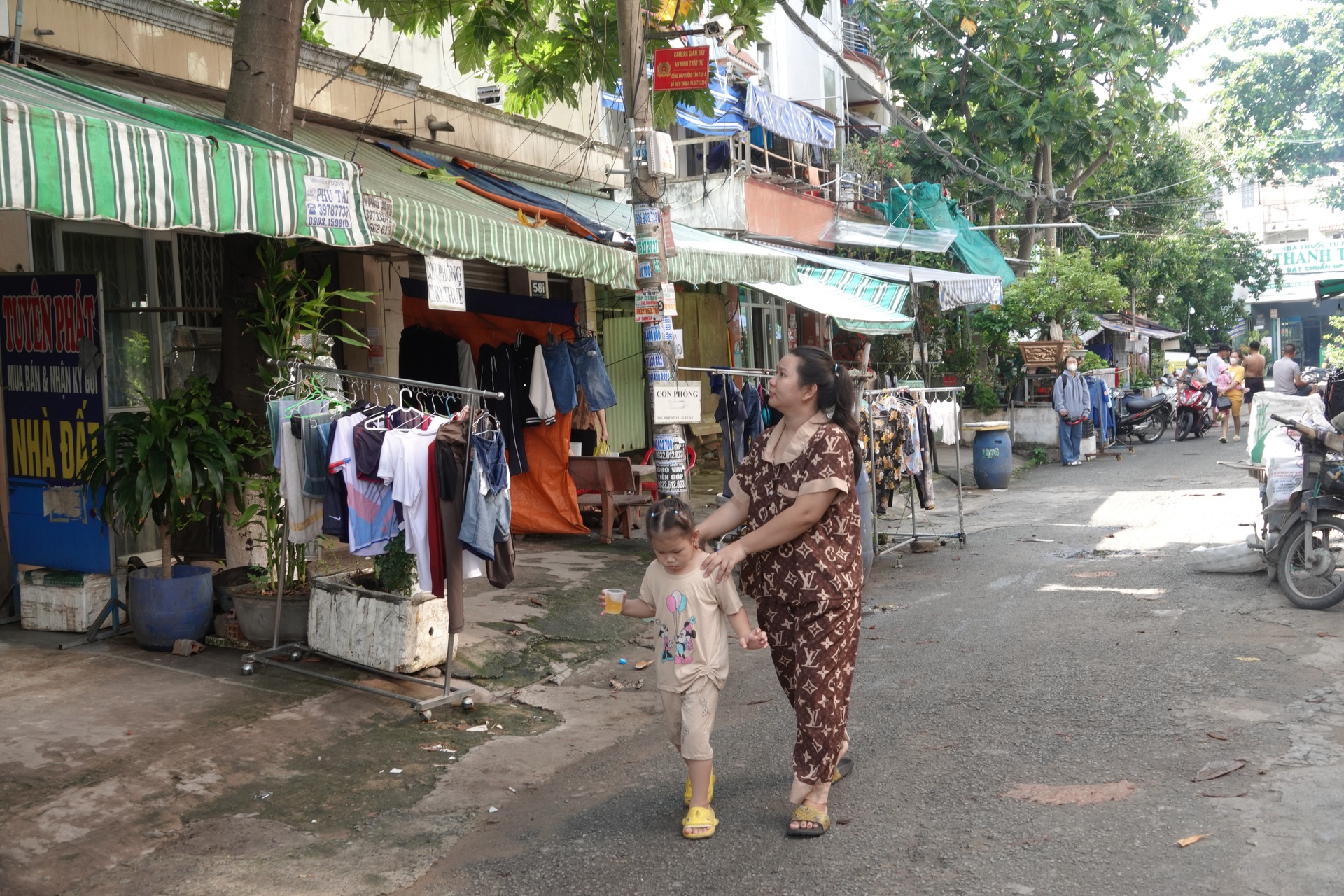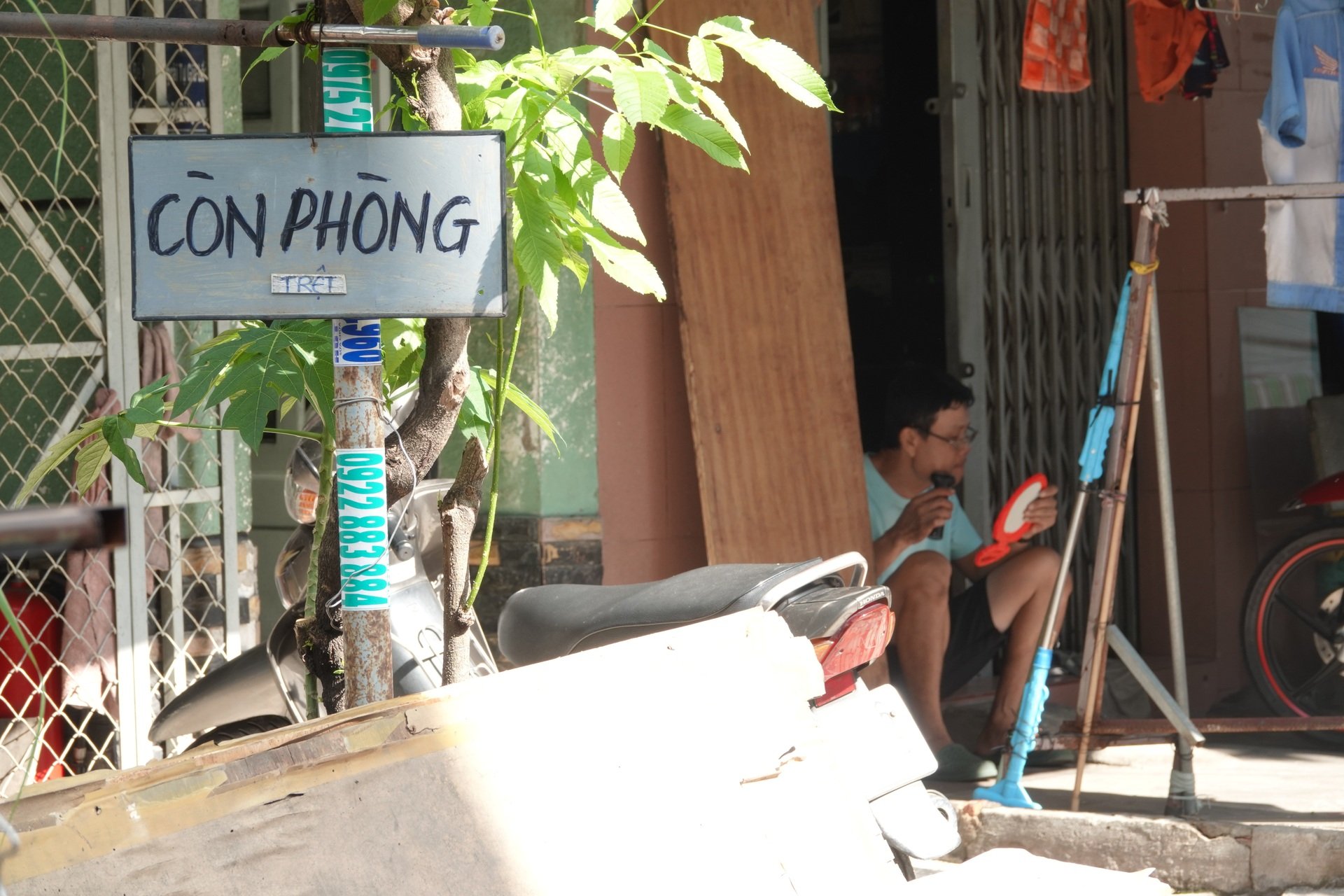Flipping through the thick debt book in her hand, Ms. Tung (56 years old, living in Tan Tao A ward, Binh Tan district, Ho Chi Minh City) shook her head in dismay, reading each line: "Mr. N. is short of 500,000 VND, Ms. T. is short of 3 million VND...".
Looking at the second page with the words all over the lines, Ms. Tung pondered for a moment and then closed the book. Ms. Tung said that she had been selling groceries at the boarding house here for more than 10 years, but had never witnessed such a difficult situation as this year.


The "capital" of deserted motels
"There are more than 20 rooms here, but now there are only 10 rooms left, mainly workers whose working hours have been reduced, trying to stay in the city. The landlord has been hanging a "for rent" sign since mid-2022, but has never filled it. Now, any room that is returned is considered empty. From here to the beginning of the alley, there are "for rent" signs everywhere, but no one has come to ask," said Ms. Tung.
Just as Ms. Tung said, along alley 58 on street number 5 (Tan Tao A ward, Binh Tan district) about 100m long, there are dozens of signs "room for rent", "cheap rooms available".
This area used to be considered the "capital" of workers' boarding houses around Tan Tao Industrial Park. But now, there are only a few poor workers, most of whom have returned to their hometowns since the end of last year. Not only alley 58, many boarding houses in Tan Tao A are in the same situation.
On average, the boarding houses here range from 800,000 VND to 1 million VND/room. Although the prices are much cheaper than other industrial parks, the boarding house owners are still "red-eyed" looking for tenants.
Many landlords have proactively reduced the rent but have been helpless. For example, the rental house across from Ms. Tung has reduced the price from 800,000 VND/room/month to 500,000 VND, but more than 10 rooms have remained empty for a whole year.


Unemployment and tightening spending have also caused Ms. Tung's income to decrease. Previously, she could earn 500,000 VND/day at her grocery store, but now it's only a few tens of thousands of VND. Not only that, workers also come to buy and ask to put their money on credit, making her even more "headache".
"Many people owe me money but I haven't been able to get it back since the pandemic. After the pandemic, they lost their jobs and returned to their hometowns, so I considered giving up that money. Seeing them suffer, I couldn't bear to ask for it back," Ms. Tung confided.
Not far away, the boarding house owned by Mrs. Tran Thi Thuat is also hanging up “for rent” signs everywhere. This boarding house has more than 40 rooms but only 6 are occupied. The people who are still staying are workers of PouYuen Company Limited, who only work about 2-3 days a week.
Previously, this row of boarding houses was always full. Tenants had to pass a "qualification round" including standards such as ethics, work, and personality before they could pay a deposit. Now, even if they ignore the above standards, no one comes to rent the rooms. Occasionally, Mrs. Thuat is fed up watching workers come up to ask for their deposit back and then... pack up and go back to their hometowns.


In addition to managing the boarding house, Ms. Thuat also sells groceries downstairs to earn extra income. With food, she only makes a profit of a few thousand dong for each item. Before, when there were many workers, she could earn 200,000-300,000 dong/day, but now sometimes she can only sell a few bottles of mineral water all day, earning 30,000 dong.
The restaurant of Mr. Son (38 years old) located in the alley where Mrs. Thuat lives is also in a state of stagnation. Mr. Son used to be a driver, the company lacked orders so he quit, he came back to sell the restaurant but also had to "disillusion" because the workers reduced their spending, choosing to stay home and cook for themselves.
On the same floor inside is the banh cuon stall of Ms. Ut (38 years old, from Thanh Hoa ). She shared that she used to work as a worker for 3 years, but quit because her salary was not enough to cover her expenses. She switched to selling banh cuon, and her income was more stable. But recently, her banh cuon stall has not been able to survive because the number of customers has decreased by more than half.
Workers try to stay because they are afraid of losing face if they return home.
In front of Mrs. Thuat's grocery store, 2-3 workers sat absent-mindedly because they were not called to work today. Quickly eating a bowl of noodles, Ms. Lam (33 years old, from An Giang , a worker at PouYuen Company) sighed: "Before, when the quantity of goods was stable, we could work overtime. Now, we have 3 days off a week, and our salary is only half, so it's very unstable."
The family still has young children living with their grandparents in the countryside, so every month the couple has to try to save money to send home. For Lam, anyone who still has a job is lucky. She herself appreciates her job, although the "three sticks three coins" salary still helps her temporarily take care of her family.


A few weeks ago, Ms. Huong (29 years old, living in Tan Tao ward, Binh Tan district) had to say goodbye to her friends in the same dormitory. Now it is her turn, she does not know how to handle it. When the company she has been with for more than 10 years, forced her to quit her job.
She has two children, the younger one is now 2 years old, the older one is about to start 2nd grade. All household expenses depend on her husband's salary.
"I have to pay more than 2 million VND per month for rent, and more than 200,000 VND per day for food. My child's tuition is also more than 3 million VND per month, not including diapers and milk. Now that I've lost my job, I don't know what to do, and I'm thinking about going back to my hometown," she shared.
Mr. Son (34 years old, from Nghe An province) also felt sad when his income was only 70% of what it was before. "I'm not married yet but I still have to take care of my old mother in the countryside. If this continues, I'm afraid I won't be able to support myself. There's no extra work here, so I have to think about going back to my hometown," Mr. Son confided.
Holding her three children in her arms, Ms. Tuyen (30 years old, from An Giang province) had tears in her eyes. Ms. Tuyen said that she left her hometown to start a career in Ho Chi Minh City when she was just over 10 years old. After working as a laborer in a foreign country for more than 20 years, she feels sad that she is still living in a rented house.


"Leaving my hometown, leaving my parents at home for more than 20 years without being able to buy a house to live in. Being a worker, I can't make any demands, and earning money to eat is already difficult," Ms. Tuyen mused.
Tuyen and her husband both work at PouYuen Company Limited. Tuyen has worked there for more than 18 years. When she heard the announcement that her working hours would be reduced, she was devastated because her salary was only enough to feed 5 people. Now, when she heard the announcement that the company was about to lay off thousands more workers, Tuyen could only "look up to the sky and let her tears flow back inside".
Previously, she and her husband earned nearly 20 million VND/month, but now their income has been reduced by more than half because she only works 2-3 days a week. Having given birth to 2 children, Ms. Tuyen also has to take care of her cousin's young son who has left to marry far away.


"If we suffer, we suffer together, I cannot give it up. Now, we workers just hope this year passes quickly, so that next year everything will be better, and we can return to our previous lives. We accept the difficulties, because we are still young, so we must try our best," said Ms. Tuyen.
When it comes to returning to her hometown, Ms. Tuyen confessed that there is not a night that she does not think about it. However, the day she left her hometown for the city, Ms. Tuyen brought with her many expectations from her family and neighbors. If she returned empty-handed, she was afraid of losing face, not knowing how to face the people back home.
According to Ms. Tran Thi Thanh Ha, Head of the Labor Relations Department, Vietnam General Confederation of Labor, from September 2022 to now, nearly 600,000 workers have had their working hours reduced or lost their jobs. Ho Chi Minh City, Long An, Tay Ninh, Dong Nai, Binh Duong, An Giang... are the localities with the most affected workers.
In fact, from September 2022 to the end of the first quarter of 2023, the whole country witnessed many businesses across the country experiencing shortages and order cuts, negatively affecting hundreds of thousands of workers. Up to 77% of workers in the three key industries of textiles, footwear, and wood processing are affected by the chain of spillover effects.
According to the General Statistics Office, the number of workers on leave at enterprises nationwide in the second quarter was about 241,500 people, a decrease of 52,500 people compared to the previous quarter.
The majority of workers taking time off work are foreign-invested enterprises, mainly concentrated in the leather, footwear and textile industries.
Some provinces where the above situation occurs are Bac Giang (9,300 people), Binh Duong (9,800 people), Quang Ngai (10,300 people), Tien Giang (11,900 people), Binh Phuoc (17,000 people), Ninh Binh (19,800 people), Thanh Hoa (98,300 people).
The number of workers who lost their jobs in the second quarter of 2023 was 217,800. The majority of them were workers in the textile, footwear, electronic components and products manufacturing, and wood processing industries.
Content: Nguyen Vy - Anh Thu
Photo: Nguyen Vy - Anh Thu
Source link






![[Video] More than 100 universities announce tuition fees for the 2025–2026 academic year](https://vphoto.vietnam.vn/thumb/1200x675/vietnam/resource/IMAGE/2025/7/18/7eacdc721552429494cf919b3a65b42e)






















































































![[Infographic] In 2025, 47 products will achieve national OCOP](https://vphoto.vietnam.vn/thumb/402x226/vietnam/resource/IMAGE/2025/7/16/5d672398b0744db3ab920e05db8e5b7d)





Comment (0)